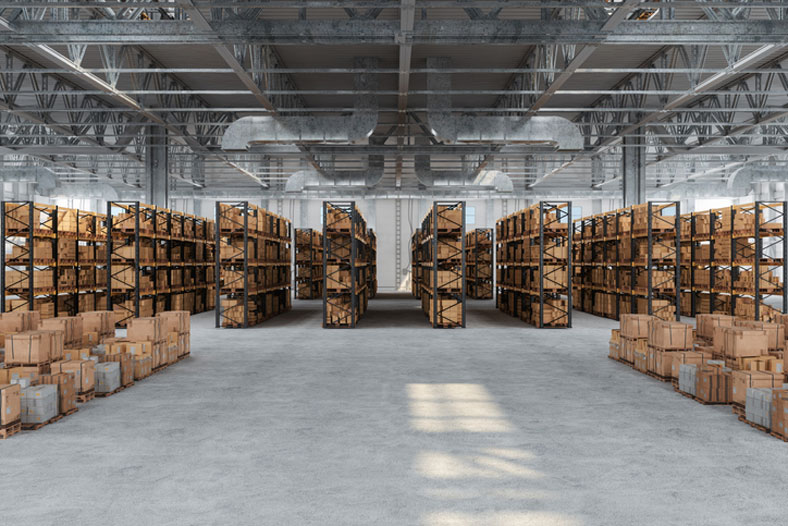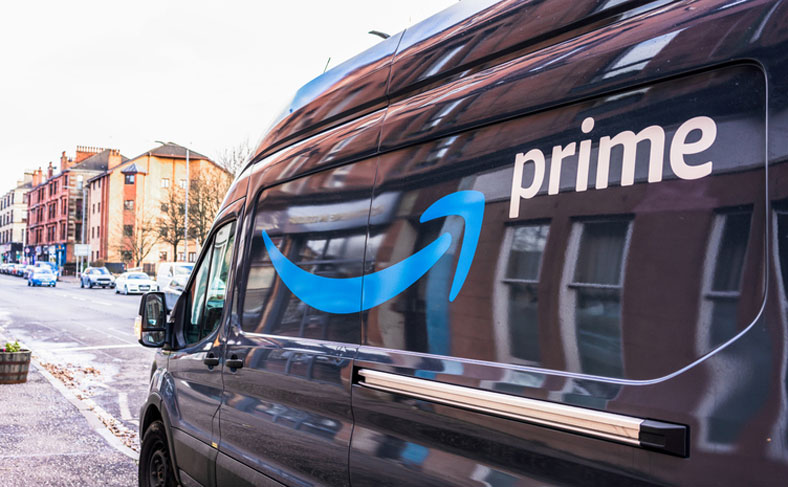Written by Scott Wilson

Over the centuries that society has been sourcing, storing, and shipping goods, there have been a lot of revolutions in how supply chains were managed. The transition from sail to steam ships cut oceanic transit times… air freight turned weeks-long trips into hours… and computerized inventory management systems dramatically reduced labor and overhead costs.
But few innovations have turned the supply chain world on its head like e-commerce.
In 1999, Jeff Bezos was named person of the year by Time Magazine. He was recognized for founding Amazon, an online bookstore that broke new ground in the world of direct-to-consumer online sales.
That same year was the first year that the Census Bureau started to track online sales. They amounted to about half a percent of total retail sales.
Fast-forward to 2022, and the American e-commerce market revenue topped $1 trillion for the first time, according to the Department of Commerce.
The pandemic really dumped rocket fuel on the e-commerce fire. From a steady climb that had taken it to around 12 percent of sales, it shot up in 2020 to over 15 percent… and has stayed there ever since.
Today, 96 percent of Americans have purchased something online at some point. That means everyone you know or will ever meet has direct experience with e-commerce. And if you’ve ever been fascinated with the magic of direct-to-consumer online sale and same-day deliveries, this might be the supply chain industry specialization for you.
What is Supply Chain Management in E-Commerce?
New Opportunities Bring New Challenges
You can tell that e-commerce has scratched an itch for consumers from the rate at which it has taken off. It also created a lot of new opportunities for direct-to-consumer businesses.
E-commerce solved a lot of problems in the traditional world of supply chain management. Connecting producers directly to consumers through online marketplaces cut out a lot of complications that existed between producers and regional distributors.
But it created one massive new problem that supply chain managers suddenly had to take on: the last mile problem.
Last mile is a figurative term, of course. It can be a few hundred feet or a hundred miles. But it’s a whole world away from the concerns of old-school supply chain managers.

The last mile is old news to delivery services, who have had to bridge that gap for decades. But with the enormous volume of e-commerce deliveries and higher expectations for customer service, it became a consideration for everyone in the business – from couriers to CEOs.
The last mile is where supply chain efficiency goes to die.
Storefronts and centralized delivery hubs all represent a single, easily defined location for products to go. The systems, security, and customer experience can be shaped and controlled.
Customer doorsteps and apartment building foyers are anything but standard. Although they may not be far from the retailers that products were delivered to previously, the transportation friction skyrockets. With no clear or available contact point, low volumes per delivery, and additional drive time, labor, packaging, and fuel costs all skyrocket.
E-Commerce Doorstep Deliveries Will Soon Arrive by Air
 Considering all the challenges of last-mile delivery, it’s no wonder that major e-commerce retailers like Amazon have gone in hard for drone delivery.
Considering all the challenges of last-mile delivery, it’s no wonder that major e-commerce retailers like Amazon have gone in hard for drone delivery.
Drones solve problems with security, traffic, and sustainability that give e-commerce transportation coordinators fits. But they introduce their own laundry list of challenges:
- FAA rule compliance
- Package size and weight limitations
- Non-standard delivery locations
- Inability to access shared facilities, like apartment buildings
- Quirky autonomous flight software
Still, the promises are such that test flights are already happening. UPS delivered medical supplies to a hospital in late 2019; Amazon has been testing with customers in California and Texas since 2022.
Although it’s slow going so far, logistics pros getting in on the ground floor of drone delivery services have a bright career ahead of them.
But delivery is just one of the challenges e-commerce introduces to the supply chain. Every day on the job is a glimpse into Pandora’s box for supply chain managers dealing with new challenges in:
- Direct customer service and support
- Handling a high volume of returns from mistaken or unwanted purchases
- Electronic account security considerations
- Inventory management and packaging for a wide range of non-standard goods
- Seasonal fluctuations in orders and delivery
Whatever the problems, the advantages of e-commerce mean it’s not going anywhere. And the gangbusters growth rate means that it will continue to be a source of new and lucrative jobs for supply chain managers with the right expertise.
E-Commerce Jobs in Supply Chain Management Offer an Opportunity to Forge New Paths

E-commerce has emerged as a specialization within supply chain management even though all the basic functions of logistics work still apply. The needs of procurement, storage, distribution, and shipping is part of the package.
The big differences are in the areas of emphasis and who is doing the hiring.
Distribution, storage, and inventory considerations are huge in e-commerce.
And because e-commerce cuts out the intermediary in both retail and B2B transactions, companies in sectors that haven’t traditionally cared about logistics are getting into the game.
Since products are no longer distributed and stocked at various retail outlets, e-commerce shops must find other options for storing them. Warehouse managers are responsible for finding and managing room for products and creating systems to quickly process orders and retrieve those goods. They also deal with packaging considerations, which are more complex when shipping a variety of single or unrelated items.
Inventory managers have their own work cut out for them. Individual orders are less predictable than bulk B2B orders from retailers. So, determining appropriate stock levels is a black art that takes both experience and expertise.
Finally, directors of transportation deal with fleets of delivery vehicles or contracts with logistics providers to handle that critical last mile service.
Analytics is another supply chain management job that got a shot in the arm from the “e” in e-commerce. All those electronic orders, tracking, and delivery systems create an unprecedented amount of data. Supply chain analytics departments crunch those numbers to provide forecasts, unearth trends, and suggest new efficiencies for their organizations.
While demand for all these positions is surging, and salaries are surging along with it, the Bureau of Labor Statistics doesn’t specifically track e-commerce supply chain salaries. Instead, you can see the general salary levels and trends for supply chain professionals here.
Amazon Supply Chain
When you’re talking about e-commerce supply chains, most of the time you’re talking about Amazon supply chain management.

There’s no use ignoring the 800-pound gorilla in the room when it comes to e-commerce supply chains. Amazon, the company that started it all, has long since set the bar for the kind of streamlined and seamless supply chain management that consumers can’t help but love:
- About 60 percent of Americans live within an hour of an Amazon fulfillment center
- Those centers handle around 10 billion packages every year… many of them delivered the same day the order was placed
- Amazon sells 90% of all eBooks and nearly half of all physical books sold today
- Most online retail sales in the United States are made through Amazon
What’s more, they have revolutionized supply chain management in general for many other companies that sell products through Amazon. Small sellers who never dreamed of competing with the big players in their niche could suddenly outsource their logistics operations to the biggest player of them all. Along with Amazon’s growth came a host of services to make global delivery possible for companies of any size.
Dropshipping, the practice of running a retail business without manufacturing or stocking any of the goods sold, exploded as Amazon grew. Estimates today credit the market with annual revenues of more than $200 billion… much of it going to companies with only one actual employee. Amazon takes care of the rest.
The incredible speed and ease of the system even created its own economic shockwave: the Amazon Effect is the euphemism used to describe the squeeze that traditional brick and mortar retailers have felt as a result of the kind of fast, inexpensive online shopping and fulfillment services Amazon is so skilled at providing.
Of course, Amazon’s industry domination hasn’t come without hiccups. The company’s move into the supply chain has led to claims that it aims to shut out other third-party logistics providers. In September of 2023, the Federal Trade Commission sued the company for wielding its monopoly power to coerce sellers into using only Amazon fulfillment services. It’s anyone’s guess how the lawsuit will play out and what adjustments the company may have to make to remain in compliance, but few things in this world are as certain as the fact that Amazon isn’t going anywhere anytime soon.
The Right Degree to Earn for Careers in E-Commerce Supply Chain Management

If there is a place in the supply chain world where educational attainment is king, it could be e-commerce.
While e-commerce has impacted all retail and many commercial businesses, it’s primarily seen as a part of the technology industry. Even if you end up working at a major brick and mortar retailer’s e-commerce division, you’ll be surrounded by techies and MBAs. The supply chain management degree you hold matters.
So, your minimum level of qualification is going to be at least a Bachelor of Science in Supply Chain Management. In senior positions – the vice presidents and senior managers in e-commerce operations – you’ll find graduate degrees to be more common, like a Master of Science in Supply Chain and Logistics Management.
Although e-commerce itself is not offered as a specialty in such programs, almost all of them have courses that specifically discuss supply chain management in e-commerce. Just as important, all of them come with classes in aspects of logistics that are critical to e-tailers:
- Warehousing and storage
- Last-mile logistics considerations
- Advanced supply chain analytics
- Order management and fulfillment services
Also key is the on-site experience that most such degrees offer. Through internships or cooperative projects with major e-commerce and logistics firms, students get important on-the-ground exposure to the cutting edge in an industry that changes daily.
For a truly big-picture look at the business and logistics angles in e-commerce and how they mix, a degree like a Master of Business Administration in Supply Chain Management is the ticket. Combining traditional business leadership training with a heavy helping of logistics coursework, these help you develop strategy and cultivate leadership skills.
Finally, if your e-commerce career path requires specialization in some other specialty, like information technology or marketing, you can tack on key supply chain management skills through a Certificate in Supply Chain & E-commerce or an E-commerce Certificate. Graduate and post-graduate certificate programs in supply chain management cut away the extra coursework you would find in a full degree program and drill down on only the relevant technical skills of their core subject.
Earning Industry-Standard Certifications Can Boost Your E-Commerce Logistics Career

On top of the general education anyone needs to get into e-commerce supply chain positions, many employers love to see candidates with professional SCM certifications.
These usually include an educational element, but at the end of the day, they are all about demonstrated professional skills. Some dive into highly specific areas like project management. Offered by industry certification bodies rather than colleges and universities, they typically require:
- Testing
- Specialized training
- Proven experience
- A specific degree level
Some even require recommendations from colleagues or supervisors.
E-commerce is still enough Wild West that credentials like these aren’t critical. But they tell larger employers that you are someone they can trust with critical functions like procurement, supplier diversity, and risk management.
If you enjoy breaking new ground and logistics is the field where you want to do it, then e-commerce is the right place for you.







